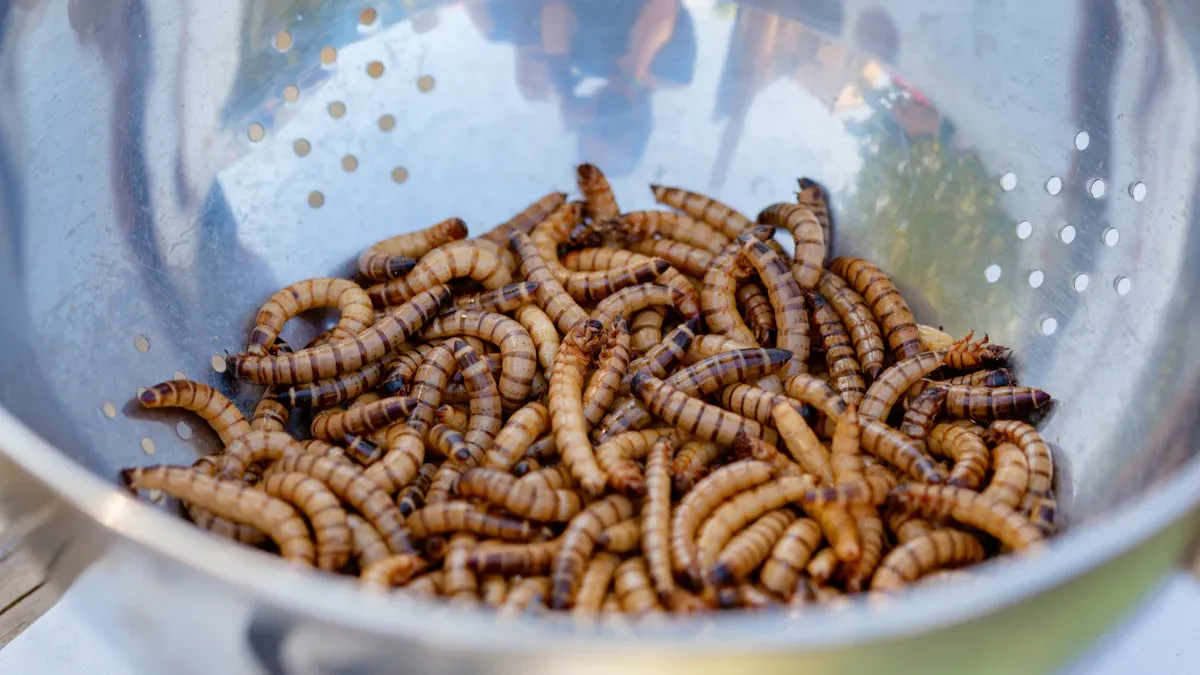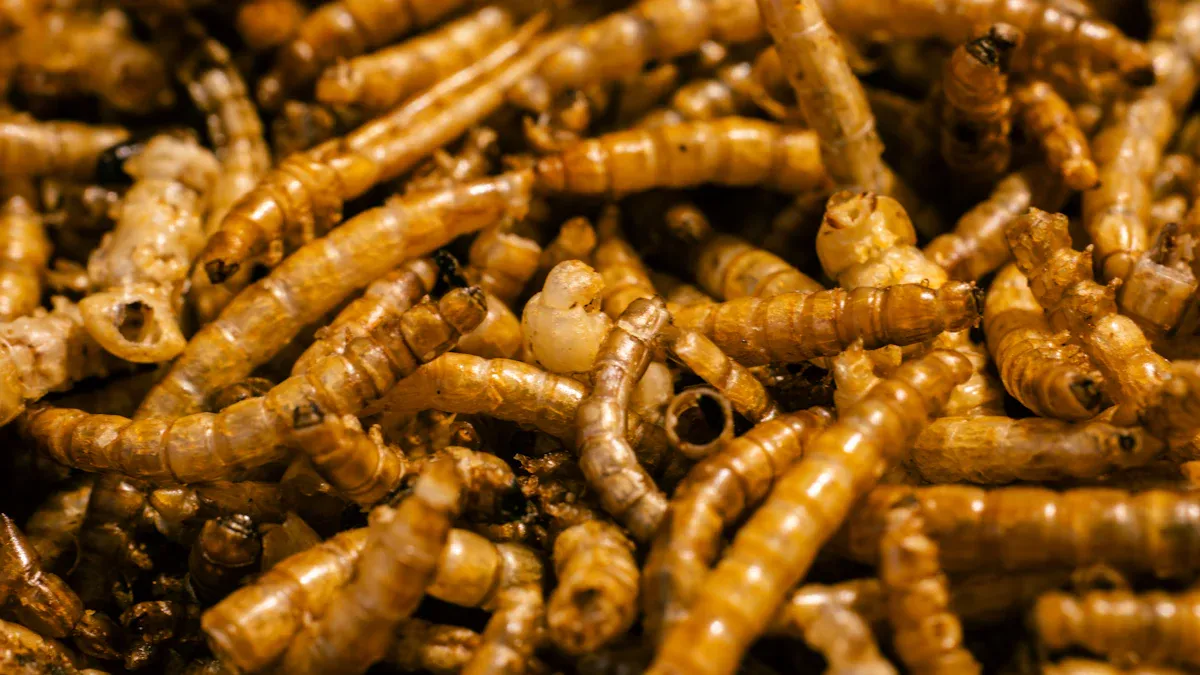
Dried Mealworms for Pets are becoming a favorite among pet owners. Packed with 53% protein, 28% fat, and 6% fiber, they offer pets a balanced and nutrient-rich snack. Their high protein content supports energy and growth, while fats and fiber promote digestive health. With the global insect-based pet food market projected to reach $11.5 billion by 2033, these treats are shaping the future of pet nutrition.
Key Takeaways
- Dried mealworms are a healthy snack for pets. They have 53% protein, 28% fat, and 6% fiber. These nutrients help with energy, growth, and digestion.
- These treats are easy to store and last a long time. You don’t need to keep them in the fridge, so they are simple to use.
- Dried mealworms have important vitamins and minerals for pets. They help pets have strong bones and better skin.
Dried Mealworms for Pets: What Are They and Why Choose Them?
What Are Dried Mealworms?
Dried mealworms are the dehydrated larvae of the yellow mealworm beetle (Tenebrio molitor). These tiny, protein-packed snacks are a favorite among pet owners because they are natural, nutrient-rich, and easy to store. The drying process removes moisture, extending their shelf life and making them safe for pets to consume.
Different drying methods, such as freeze-drying, oven-drying, and sun-drying, can affect the nutritional quality of mealworms. Freeze-dried and oven-dried mealworms retain most of their protein content, while sun-dried ones may experience slight color changes due to natural chemical reactions. Regardless of the method, dried mealworms remain a reliable source of protein, fats, and essential nutrients for pets.
| Nutritional Component | Value Range (DM) |
|---|---|
| Protein | 41.0–63.7 % |
| Fat | 17.0–50.1 % |
| Fiber | 3.7–15.0 % |
| Vitamins | B2, B5, B7, B12 |
| Minerals | K, Ca, Fe, Mg |
Key Benefits of Dried Mealworms
Dried mealworms for pets offer a range of health benefits that make them stand out from other treats. Their high protein content supports growth, energy, and muscle development. Pets like birds and reptiles benefit from the essential amino acids, which aid in feather regrowth and skin health.
These treats are also rich in healthy fats, which improve coat quality and promote better skin hydration. Vitamins like B12 and minerals such as calcium and magnesium contribute to stronger bones and overall well-being. Additionally, dried mealworms are 100% natural, non-GMO, and sustainably sourced, making them an eco-friendly choice for pet owners.
Pet owners also appreciate their convenience. Unlike live mealworms, dried ones don’t require refrigeration and have a long shelf life. This makes them a practical option for busy households. Whether it’s a bird in need of extra protein during molting or a reptile craving a nutritious snack, dried mealworms are a versatile and healthy addition to any pet’s diet.
Nutritional Profile of Dried Mealworms for Pets

Protein: Supporting Growth and Energy
Protein is the cornerstone of any pet’s diet, and dried mealworms for pets deliver it in abundance. With an impressive protein content of 53%, these treats provide the essential building blocks for muscle growth, energy production, and overall vitality. Pets like birds, reptiles, and fish thrive on high-protein diets, especially during periods of growth or recovery.
Studies have shown that mealworm protein is not only abundant but also highly digestible. For example:
| Study | Findings | Implications |
|---|---|---|
| Influence of Different Diets on Growth and Nutritional Composition of Yellow Mealworm | Mealworms raised on wheat bran had 47.9% protein content. Protein content of larvae nearly doubled compared to their diets. | High protein content in mealworms can contribute to improved nutritional value in pet food. |
| Digestibility of mealworms as pet food ingredients | Mealworm-based ingredients are high-quality protein sources with over 90% digestibility for most amino acids. | Suggests mealworms are valuable protein sources for pet foods. |
| Study by Maastricht University | Mealworm protein has similar attributes to milk protein, aiding in digestion and muscle growth. | Indicates mealworm protein can effectively support growth and energy in pets. |
This high-quality protein ensures that pets stay active and healthy. Whether it’s a bird regrowing feathers or a reptile building muscle, dried mealworms for pets are a reliable source of energy and strength.
Fats and Fiber: Promoting Digestive and Skin Health
Dried mealworms for pets are not just about protein. They also contain 28% fat and 6% fiber, which play crucial roles in maintaining digestive and skin health. The fats in mealworms provide a concentrated source of energy, helping pets stay active and maintain a shiny coat or vibrant scales.
Fiber, on the other hand, works wonders for digestion. Mealworms contain chitin, an insoluble fiber found in their exoskeletons. Chitin stimulates intestinal movement, improves stool quality, and even supports liver health by reducing cholesterol levels. This, in turn, enhances skin health by promoting overall well-being.
Tip: The beneficial bacteria in a pet’s gut thrive on chitin, helping maintain a healthy intestinal barrier. This not only aids digestion but also boosts immunity and skin hydration.
By combining healthy fats and fiber, dried mealworms for pets offer a balanced nutritional profile that supports both internal and external health.
Vitamins and Minerals: Enhancing Overall Well-Being
Dried mealworms for pets are packed with essential vitamins and minerals that contribute to their overall well-being. These include:
- Vitamins: B2, B5, B7, and B12, which support energy metabolism, red blood cell production, and nervous system health.
- Minerals: Potassium (K), Calcium (Ca), Iron (Fe), and Magnesium (Mg), which strengthen bones, improve muscle function, and boost immunity.
These nutrients are especially important for pets during stressful periods, such as molting in birds or breeding in reptiles. For example, calcium and magnesium help strengthen eggshells in birds and support bone development in young pets.
By providing a rich mix of vitamins and minerals, dried mealworms for pets ensure that your furry, feathered, or scaly friends stay healthy and happy.
How Dried Mealworms Benefit Different Pets

Birds: Boosting Feather Health and Energy
Birds thrive on protein-rich diets, and dried mealworms for pets are a perfect match. These treats provide the essential nutrients birds need to maintain energy levels and support feather regrowth. During molting seasons, when birds shed and regrow feathers, their protein requirements increase significantly. Mealworms step in as a reliable source of high-quality protein, helping birds stay vibrant and healthy.
Robins, in particular, are known to be “mealworm gourmets.” They eagerly feast on these nutritious snacks, especially during spring when they’re busy building nests and raising chicks. The protein in mealworms also plays a crucial role in the development of young birds, ensuring they grow strong and healthy.
Tip: Offering dried mealworms in your garden can attract a variety of bird species, turning your backyard into a lively haven for feathered friends.
Reptiles: A Natural and Nutritious Snack
Reptiles benefit immensely from the high protein and fat content in dried mealworms. These nutrients are essential for energy, muscle development, and overall health. Mealworms also provide a natural source of calories, making them an excellent choice for exotic reptiles.
- Mealworms contain approximately 15% fat, which helps reptiles absorb vitamins, store energy for egg-laying, and regulate body temperature.
- They are rich in essential amino acids, supporting muscle building and cell maintenance.
- Compared to conventional meat, mealworms offer more calories and protein per 100 grams, making them a nutrient-dense snack.
Reptiles like geckos and bearded dragons enjoy the taste and texture of mealworms, making feeding time both nutritious and enjoyable. These treats also encourage natural hunting behaviors, keeping reptiles active and engaged.
Fish: Supporting Growth and Vibrancy
Dried mealworms for pets can also benefit fish, particularly species that thrive on high-protein diets. While the chitin in mealworms’ exoskeletons may slightly impact growth, it offers unique advantages for intestinal health. Chitin stimulates gut fermentation, improving digestion and overall fish welfare.
Research highlights additional benefits:
- Chitosan, derived from chitin, enhances feed digestibility and nutrient absorption in fish like tilapia and Labeo rohita.
- Insect-based diets, when combined with turmeric, improve nutrient metabolism and growth performance by boosting digestive enzyme activity.
These findings suggest that mealworms can support fish growth, enhance their vibrancy, and contribute to a healthier aquatic environment. For pet fish, mealworms are a tasty and beneficial addition to their diet.
Small Mammals: A Tasty and Healthy Supplement
Small mammals, such as hamsters, hedgehogs, and sugar gliders, love the taste of dried mealworms. These treats not only satisfy their cravings but also provide a host of health benefits:
- High Protein Content: Mealworms are packed with protein, essential for growth and muscle development.
- Nutrient-Rich: They contain vitamins like B12 and E, along with minerals such as calcium and iron.
- Easy to Digest: Their soft exoskeleton makes them gentle on small mammals’ digestive systems.
- Promotes Healthy Skin and Coat: The combination of protein and healthy fats contributes to a shiny coat and hydrated skin.
- Energy Boost: Mealworms provide a quick source of energy, perfect for active pets.
- Encourages Natural Behavior: Feeding mealworms stimulates foraging instincts, keeping pets mentally engaged.
Adding mealworms to a small mammal’s diet introduces variety and prevents monotony. They’re also a great bonding tool, as hand-feeding these treats can strengthen the connection between pets and their owners.
Feeding Dried Mealworms to Pets: Practical Guidelines
Recommended Feeding Quantities
Feeding pets the right amount of dried mealworms ensures they get the benefits without overindulging. For birds, a handful of mealworms daily is sufficient, especially during molting or nesting seasons. Reptiles, like geckos or bearded dragons, can enjoy 5–10 mealworms per feeding, depending on their size. Small mammals, such as hedgehogs, thrive on 1–2 teaspoons of mealworms as a treat. Fish owners can sprinkle a small pinch into the tank, ensuring it’s consumed within a few minutes to avoid overfeeding.
Tip: Always adjust quantities based on your pet’s size, activity level, and dietary needs.
Preparation and Serving Tips
Serving dried mealworms is simple and versatile. For birds, scatter them in feeders or mix them with seeds to encourage natural foraging. Reptiles may prefer mealworms rehydrated in warm water to soften their texture. Small mammals enjoy them as-is or mixed with their regular food.
Research highlights that freeze-dried mealworms retain the most nutrients, making them a top choice for pet owners. While microwave cooking can lead to some nutrient loss, innovative methods like high hydrostatic pressure are emerging as effective ways to preserve their value.
Note: Always ensure mealworms are free from additives or preservatives before serving.
Storage for Freshness and Quality
Proper storage keeps dried mealworms fresh and nutritious. Store them in an airtight container in a cool, dry place to prevent moisture and spoilage. For long-term storage, refrigeration or freezing is ideal. Studies show that lactic acid fermentation is an effective method for preserving mealworm products, maintaining their quality for weeks without microbial spoilage.
Tip: Label containers with purchase dates to track freshness and avoid using expired products.
Monitoring Pet Health and Adjusting Diet
Regularly observe your pet’s health after introducing dried mealworms. Look for signs of improved energy, coat shine, or growth. If your pet shows signs of weight gain or digestive issues, reduce the quantity or frequency of feeding. Always consult a veterinarian for personalized dietary advice.
By following these guidelines, pet owners can confidently incorporate dried mealworms into their pet’s diet, ensuring a healthy and happy companion.
Dried mealworms are a game-changer for pet nutrition. Their protein-rich profile supports growth and energy, while essential amino acids rival those found in commercial soybean meal. Pets digest mealworms easily, making them a superior choice for overall health. Adding these treats to a pet’s diet boosts vitality and ensures they thrive year-round.
Author: Felix
FAQ
How should I store dried mealworms to keep them fresh?
Store them in an airtight container in a cool, dry place. For long-term freshness, refrigeration or freezing works best.
Can I feed dried mealworms to baby birds?
Yes, but rehydrate them first by soaking in warm water. This makes them softer and easier for baby birds to digest.
Are dried mealworms safe for all pets?
Absolutely! They’re safe for birds, reptiles, fish, and small mammals. Always feed in moderation and consult a vet for specific dietary needs.
Tip: Introduce dried mealworms gradually to ensure your pet adapts well to this new treat.


